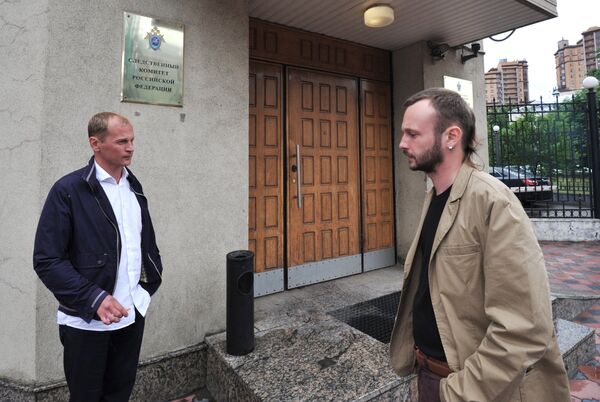MOSCOW, June 11 (RIA Novosti) – The Russian Investigative Committee has launched a criminal case into the recent detention of two Russian Zvezda TV journalists in Ukraine, the committee’s spokesman said.
"This criminal case was combined with another case, launched earlier into the use… of banned means and methods of warfare," Spokesman Vladimir Markin said.
In late May, Russia’s Investigative Committee launched a criminal probe into the use of banned means and methods of warfare during Kiev’s military operation against federalists in eastern Ukraine.
The criminal case was opened against unidentified military personnel, including members of Ukraine’s National Guard, as well as members of the Right Sector, in connection with the bombardment of the cities of Slaviansk, Kramatorsk, Donetsk, Mariupol and other populated areas.
Russian investigators believe that Kiev-controlled forces have purposely used shoot-to-kill tactics against the civilian population to quash the resistance of federalists in these areas in violation of the Geneva Convention on Protection of Civilian Persons in Time of War (adopted in August 1949) and those responsible must be punished in line with international laws.
The journalists of the Russian TV channel Zvezda, supervised by the Defense Ministry, disappeared after a search conducted by Ukraine’s National Guard near Slaviansk last week.
Cameraman Andrei Sushenkov and sound engineer Anton Malyshev were on a business trip to cover the inauguration ceremony of new Ukrainian President Petro Poroshenko. The contact with them was lost on Friday afternoon.
Later, it was reported that they had been arrested on suspicion of monitoring the security forces at the checkpoint and collecting information about it. The media representatives were handed over to the Security Service of Ukraine (SBU).
Early on Monday, the two detainees were released and taken to Moscow by a plane of the Russian Ministry of Defense. The journalists said they had nowhere to sleep, were not allowed to talk, and there were constant threats during their detention.


